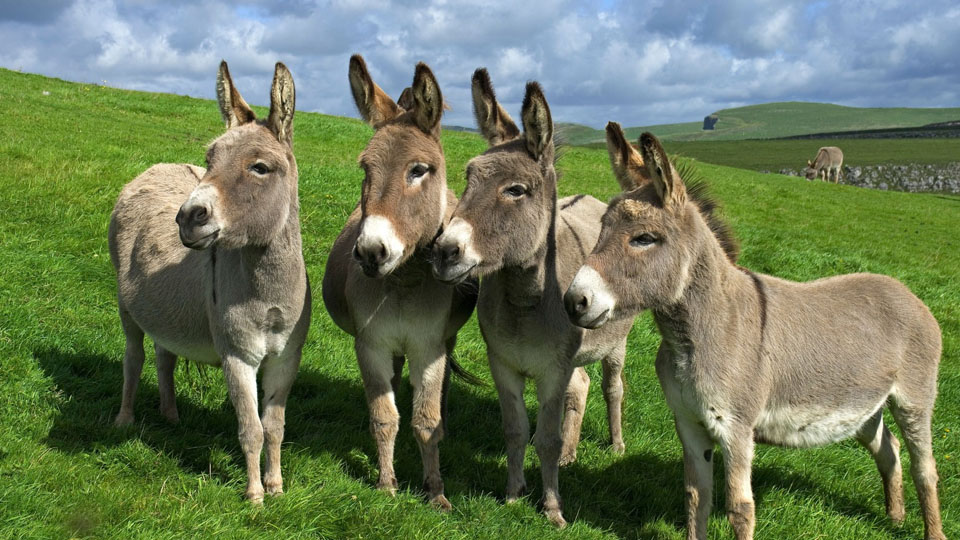By Maneka Gandhi
In this week’s Pet Talk, Maneka tells about mange in donkeys and plant poisoning symptoms in donkeys and horses.
How can I tell if my donkey has mange, and what can I do about it?
A donkey infested with mange mites will be suffering intense irritation to the skin which will have lesions, scabby areas and consequent loss of hair. As mite numbers increase, so do the skin sores and scabs until the skin becomes raw and leathery in some areas. There are many different types of mange mites and treatment will depend on both the type and how far the condition has progressed before diagnosis. In all cases a veterinary surgeon should be consulted for a correct diagnosis, as the symptoms are very similar to both lice infestation and rain scald.
In the case of lice infestation, the lice themselves, and certainly the eggs, can usually be seen on the coat very close to the skin, whereas the mange mite is invisible to the naked human eye. Lice can be treated very effectively with some pour-on products like Butox and Redict, which are primarily made for cattle and sheep, but beware, as some pour-on products are dangerous for equines.
Mange invariably needs to be treated with washes specific to the type of mite and can take from one week to one month to eradicate.
Rain scald is usually caused by the donkey being left out in wet weather without shelter. The rain seeps deep into the coat and causes chapping, which in turn causes irritation, so the donkey rubs a sore patch with subsequent scabbing and hair loss.
As long as rain scald is not seriously infected it may be treated by carefully trimming away excess loose hair and applying an antiseptic cream or gel to the area. Seriously infected skin may require antibiotics and other veterinary intervention. Neem oil has been reported for successfully treating scabies, which is a serious skin disease caused by one of the same mites that causes mange.
How do I recognise symptoms of plant poisoning in horses and donkeys?
First of all, if you have any reason to believe your equine has been poisoned, call your vet immediately, giving as much information as possible, however trivial it may seem. Whilst some poisons are not aggressive, and can be treated, others are very aggressive and, if treatable at all, are extremely time sensitive.
Symptoms cover a huge range and can sometimes be contradictory:
- Excessive sweating; • Lethargy or over-excitability; • Irritability; • Convulsions; • Uncoordinated movement; • Photosensitivity; • Frothing at the mouth or regurgitation; • Diarrhoea; • Excessive salivation; • Tremors; • Twitching of the head and eye muscles; • Staggering; • Mouth blisters; • Clamping of the jaws; • Weak/ rapid pulse; • Blood in urine.
What do donkeys eat?
A donkey’s dry matter intake is higher than other large herbivores, being up to 3.1% of their live bodyweight, which means they need considerably more fibre and less protein than horses. Ideally, they will eat up to 5% their live bodyweight daily in feeding straw (barley) or hay.
Donkeys, out at grass, do not need good quality grass and should be carefully monitored for overfeeding in the presence of rich, lush, grass and clover. In the wild they may travel up to 30 kms a day grazing and browsing for food, which would include a large variety of shrubs, bark, berries and different types of plants.
Over feeding leads to obesity and heart disease, as lack of exercise when confined to a limited area with nothing to do but eat does; and both can quickly lead to laminitis, an incredibly painful condition which manifests in the hooves and causes permanent damage. If it is necessary to supplement a donkey’s feed, as with older donkeys, sick donkeys or donkeys with tooth problems, always choose a low protein mix (6-10%) without oats (generally known as a cool feed mix) as oats are very warming and can also lead to laminitis.
Lightly molassed chaff, or chaff with no molasses, are good for filling if there is difficulty in chewing hay or straw, and soakable fibre nuts are excellent for donkeys with mouth problems, as they can be served as wet as is necessary to facilitate eating.
A salt lick, or mineral lick, is usually appreciated by donkeys which do not have a large area of natural terrain to browse, as it will supplement any missing minerals.
How to match PH of aquarium water?
Lowering pH: One method to lower pH is to mix distilled or RO (reverse osmosis) water with your tap water to reduce both the hardness and pH. This is effective for smaller pH changes, and you must keep in mind that every time you perform a water change, or top off the tank, you’ll have to mix water. In other words, if you need to greatly lower the pH of your water, think twice – it is going to be an uphill battle.
Raising pH: It’s not often that the pH must be increased, as most water sources are already slightly to moderately alkaline. In the event your water is acidic, you want to keep fish that originate from alkaline water (as is the case for certain Cichlids). Filtering the water over crushed coral is the method of choice for raising the pH.
The use of limestone rocks in decorating the tank will also raise the pH, but keep in mind that you will not be able to adjust it readily. The addition of bicarbonate of soda (baking soda) will also raise the pH and has the added benefit of buffering the water. Keep in mind that this will be an ongoing thing, so you can’t add it once and forget about it.








Recent Comments